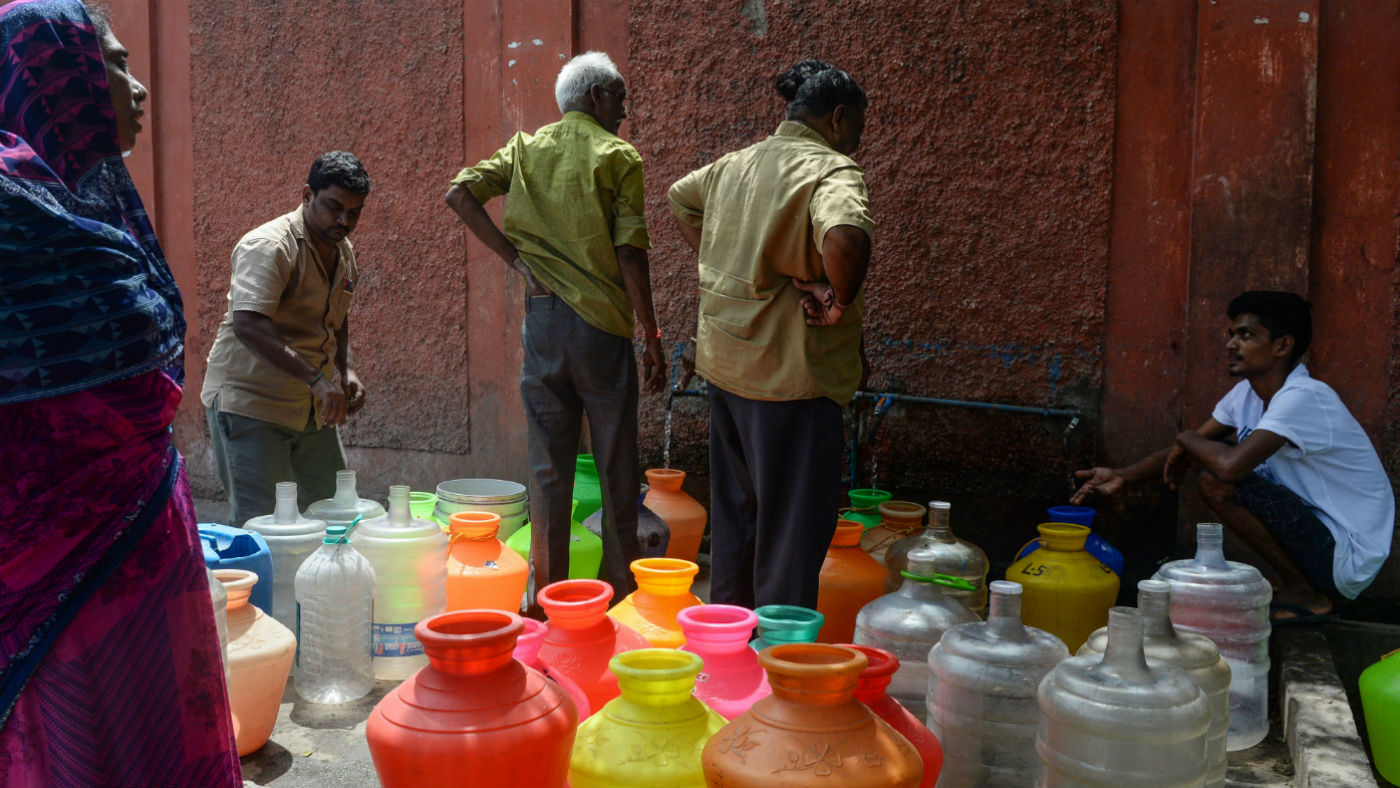Dry Chennai: Indian megacity ‘running out of water’
Drought hits 4.6 million people as taps run dry during heatwave

A free daily email with the biggest news stories of the day – and the best features from TheWeek.com
You are now subscribed
Your newsletter sign-up was successful
Millions of people in Chennai are relying on government supplies of drinking water as a brutal heatwave leaves the vast city’s reservoirs almost completely dried out.
Formerly known as Madras, Chennai is India’s sixth-largest city, with 4.6 million inhabitants recorded in the most recent census, in 2011. Now, hundreds of thousands are queuing for daily government deliveries of water as taps run dry, says CNN.
In an article for Chennai-based newspaper The Hindu, Markandey Katju says: “There are pictures going around of rows of women holding plastic buckets and waiting for tankers.
The Week
Escape your echo chamber. Get the facts behind the news, plus analysis from multiple perspectives.

Sign up for The Week's Free Newsletters
From our morning news briefing to a weekly Good News Newsletter, get the best of The Week delivered directly to your inbox.
From our morning news briefing to a weekly Good News Newsletter, get the best of The Week delivered directly to your inbox.
“IT firms, restaurants and the construction industry have all admitted that they are struggling without water. Clashes over water have been reported in some parts. It is a bad situation.”
Wealthier residents have been relying on private deliveries of water from other cities and towns in Tamil Nadu state, but demand exceeds supply, sending prices to levels well beyond the means of Chennai’s estimated 820,000 slum dwellers.
Waiting for the monsoons
Earlier this week, the chief minister of Tamil Nadu implored residents to minimise their use of water, warning that there is “a need to manage with available water” until the monsoon season arrives in October or November. But he insisted there was no cause for panic, adding: “Lorries are being sent continuously to areas to supply water ... wherever there is drinking water scarcity.”
A free daily email with the biggest news stories of the day – and the best features from TheWeek.com
The shortages are the result of low groundwater levels following years of reduced rainfall, with the situation worsened by a fatal heatwave that is affecting the entire country. Indeed, CNN says that a total of 600 million people across India are struggling with “high to extreme water shortages” during the dry season.
The Sunday Times reported last week that “tens of thousands have fled drought-stricken villages across northern India” followings weeks of 50C temperatures, with police deployed to keep order at wells.
The new normal
Other parts of the globe are also struggling for drinking water, as a result of climate change and increasing population. Last year, Cape Town was days away from exhausting its water supply.
“This should be a wake-up call for city authorities and national governments around the world,” the Financial Times warned at the time. “Many of the world’s largest cities are acutely vulnerable to the effects of climate change - longer droughts, heavier rainfall, rising sea levels, fiercer wildfires, worsening air pollution and searing heatwaves.”
“This is part of the new normal,” agrees Esquire, “and it’s coming soon to a theatre near you.”
The Daily Telegraph warned last summer that more than five billion people could be suffering from water shortages by 2050.
The newspaper noted that legendary Wall Street trader Michael Burry - one of the only people to see the 2007 financial crisis coming - is now focusing his dealing activities on the commodity of water.
-
 Nuuk becomes ground zero for Greenland’s diplomatic straits
Nuuk becomes ground zero for Greenland’s diplomatic straitsIN THE SPOTLIGHT A flurry of new consular activity in the remote Danish protectorate shows how important Greenland has become to Europeans’ anxiety about American imperialism
-
 ‘This is something that happens all too often’
‘This is something that happens all too often’Instant Opinion Opinion, comment and editorials of the day
-
 House votes to end Trump’s Canada tariffs
House votes to end Trump’s Canada tariffsSpeed Read Six Republicans joined with Democrats to repeal the president’s tariffs
-
 Epstein files topple law CEO, roil UK government
Epstein files topple law CEO, roil UK governmentSpeed Read Peter Mandelson, Britain’s former ambassador to the US, is caught up in the scandal
-
 Iran and US prepare to meet after skirmishes
Iran and US prepare to meet after skirmishesSpeed Read The incident comes amid heightened tensions in the Middle East
-
 EU and India clinch trade pact amid US tariff war
EU and India clinch trade pact amid US tariff warSpeed Read The agreement will slash tariffs on most goods over the next decade
-
 Israel retrieves final hostage’s body from Gaza
Israel retrieves final hostage’s body from GazaSpeed Read The 24-year-old police officer was killed during the initial Hamas attack
-
 China’s Xi targets top general in growing purge
China’s Xi targets top general in growing purgeSpeed Read Zhang Youxia is being investigated over ‘grave violations’ of the law
-
 Panama and Canada are negotiating over a crucial copper mine
Panama and Canada are negotiating over a crucial copper mineIn the Spotlight Panama is set to make a final decision on the mine this summer
-
 Why Greenland’s natural resources are nearly impossible to mine
Why Greenland’s natural resources are nearly impossible to mineThe Explainer The country’s natural landscape makes the task extremely difficult
-
 Iran cuts internet as protests escalate
Iran cuts internet as protests escalateSpeed Reada Government buildings across the country have been set on fire